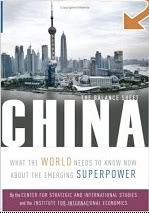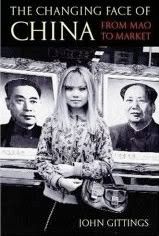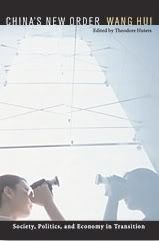An interview with author James Mann
 James Mann is author in residence at Johns Hopkins University's Paul H Nitze School of Advanced International Studies. He is the author of the New York Times best-seller Rise of the Vulcans: The History of Bush's War Cabinet, and two books about China: About Face: A History of America's Curious Relationship with China, from Nixon to Clinton, and Beijing Jeep.
James Mann is author in residence at Johns Hopkins University's Paul H Nitze School of Advanced International Studies. He is the author of the New York Times best-seller Rise of the Vulcans: The History of Bush's War Cabinet, and two books about China: About Face: A History of America's Curious Relationship with China, from Nixon to Clinton, and Beijing Jeep.His most recent book is The China Fantasy: How Our Leaders Explain Away Chinese Repression. For a review of this book, see The third way for China . Mann was previously a diplomatic correspondent and foreign-affairs columnist for the Los Angeles
Times, serving from 1984 to 1987 as Beijing bureau chief. He lives in Silver Spring, Maryland. Mann spoke to Benjamin A Shobert.
Benjamin A Shobert: I would like to start with the most general question: Why write this book now?
James Mann: No singular event prompts writing this book now. Enough has happened since the developments of the '90s, beginning with the formulation of what I call the "China fantasy", without fundamental change, that it seemed time to look back and note how little change has occurred and examine our assumptions. I have done two other books on China, one focusing on business and one on diplomacy, and had been thinking for some time that I wanted to write this book.
BAS: Would you quickly characterize the three scenarios for China that you present?
JM: The first is the "Soothing Scenario": China is going to evolve and develop toward political liberalization and democracy, and that trade will help with this change. The second is what I call the "Upheaval Scenario": to use the vernacular, that China is going to "blow up" - for example, that some serious rupture in their banking system will in turn lead to dramatic political change. One book which argues for this is Gordon Chang's The Coming Collapse of China.
There is what I call the "Third Scenario": politically, what we see in China is what we are going to get - one political system, no organized opposition, no independent judiciary. There are all kinds of nuances on the ground within China, so I don't mean to say that China is not changing. Small-scale changes are taking place, but these may not lead to fundamental changes.
BAS: Given your experience in China and the analysis you completed for this book, what do you believe are the primary crises that could derail China's modernization efforts?
JM: I think their economic growth is likely to continue; the banking system could be a problem. But I don't see a crisis within that sector leading to political change.
BAS: Is there any one particular crisis that you believe is most under-appreciated or misunderstood within the US policy community?
JM: It is difficult for many to appreciate the pressure that is building up within China to preserve the status quo. For obvious and understandable reasons, people travel to Beijing and Shanghai, then meet and talk to the urban elites. Outsiders don't go into China and talk to migrants; they talk to people who are highly educated, brilliant, really sophisticated, and get the idea that China is destined for political change. What they don't see is that the urban elites have it in their interest to maintain the status quo. They are doing quite well and are extremely nervous about political changes.
BAS: Your suggestion that China's middle class, because of their interests in seeing the economic system continue to grow, might represent some of the most strenuous resistance to political change within the country stopped me cold. I found it profoundly important.
JM: I am glad that point came through clearly.
BAS: At the last US-China Economics and Security Review Commission hearing, your testimony about the inadequacies of what you call the "Soothing Scenario" seemed to be unevenly received by some. How would you characterize the early criticism of your book, and your particular point that justifications by the "Soothing Scenario" might not be appropriate?
JM: Different ideas in my book do run against the grain of beliefs people have had for some time. These ideas should be up for debate.
BAS: Reading your book, it seemed to me that you want policymakers and the American public to ask themselves a pretty basic set of questions about how Americans think about engaging China. If you were to reduce your analysis to a one-or-two-sentence question or point for these communities, what would you ask them to think about?
JM: I would ask them to drop or put aside the prediction that political change is inevitable and look at the likelihood of the Chinese system staying as is. I am hoping people will begin to think about American policy and China's future with these things in mind.
BAS: How would you respond to those who point toward, as one example, the gradual transition of Hong Kong's pre-1970 political system and its incremental accommodation of various reforms with the suggestion that similar gradual changes are taking place in China, and will have similar ultimate results?
JM: Two points: it is always a mistake to draw conclusions comparing Hong Kong to China, just as it is a mistake to compare China with Singapore or South Korea, a point I make in my book. Second, yes, China is allowing small changes in Hong Kong, but the meaning these changes have for China is ambiguous at best. You can see limits to the democratic changes China is going to allow in Hong Kong.
BAS: Is it, in your mind, a situation where the sum of the parts of small changes may not equal the whole of real reform?
JM: Yes.
BAS: It seemed to me that a sub-text of your book is that the world might be selling its soul - looking the other way on basic questions of freedom and liberty - because of the mutual economic incentives that exist between China and the world. Is that correct and, if so, what would such a compromise suggest about US culture and politics?
JM: I don't want to get bogged down in language, but I think "selling its soul" is overstating things. People who believe that an economic relationship will result in liberalization can believe this sincerely, but consequently serve certain business interests. In a larger sense, this shows the American belief that the world wants to become like us and a reluctance on our part to recognize that a country like China is determined to follow its own path. People look at China and assume it will develop just like us.
BAS: If we take your criticism seriously, what types of changes would you suggest policymakers look for within China to indicate which of your scenarios is playing out?
JM: We need to look at the right to dissent. We need to look at the ability of organized political opposition to come together. We need to look at whether judges can be truly independent of the Communist Party. We need to look at controls on the press.
BAS: Should the US focus on holding China accountable to a specific set of reforms beyond the mandatory World Trade Organization compliance items and, if so, what types of reforms do you believe would be most efficacious at drawing out substantive change within China?
JM: These things [business and political change] can run on their own track. There is a strong and legitimate interest by American and other - European and Japanese - countries for China to develop a predictable rule of law and system for dispute resolution. It is not hard for China to set up two tracks of dissent, to focus on the rule of law in a business sense, but not for individuals.
BAS: As someone quite provoked by your cautionary analysis, I finished this book with one looming question: If the current model of "engagement" and "integration" is inadequate (two words you want the US to use carefully), what is the right way to engage China?
JM: I don't have a detailed five-point answer on what our strategy should be. "Engagement" as a concept is incredibly important; of course we should talk to China's leaders, but as a small "e", not a big "E" of engagement. I would like to see America start to have a discussion on what policies we should use and whether we will be comfortable with the possibility of an economically powerful one-party Communist China in 20 years.***
Benjamin A Shobert is the managing director of Teleos Inc (www.teleos-inc.com), a consulting firm dedicated to helping Asian businesses bring innovative technologies into the North American market.
Link




0 Comments:
Post a Comment
Subscribe to Post Comments [Atom]
<< Home